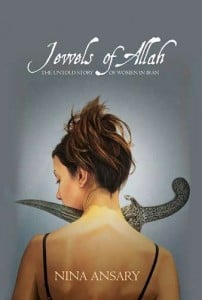Reading Hajiya Balaraba Ramat Yakubu’s Sin is a Puppy That Follows You Home was to me like watching a Nigerian movie, in particular one on Africa Magic Hausa, a channel devoted to Hausa language movies. I could picture popular actors and actresses in the roles of different characters and imagined them bringing these roles to life. I have no idea if there is a movie equivalent of Sin is a Puppybut there just might be a movie version, considering that Yakubu has ventured into Kannywood (the Hausa movie industry based in Kano) herself.
“I hope my story will serve as a lesson to the Muslim community. May the Lord God make the sinners change their ways, as He does not forgive a man’s crime against another.”
One is supposed to read this book and be inspired to change. The sinner should renounce sin, and the pious ones should rest assured that God will reward them.
![[Source].](https://wp-media.patheos.com/blogs/sites/92/2014/09/sin-is-a-puppy-200x300.jpg)
Matters take a turn for the worse when Alhaji Abdu marries Delu a twice-divorced former sex worker. Delu is portrayed as the “sin” that Alhaji Abdu brings home with him, which eventually leads to him kicking Rabi and her children out of their home after a violent altercation breaks out between the first and second wives. Rabi is then forced to become a single mother but is able to thrive, primarily due to her faith in Allah. She gets to see her first son Kabiru go to university, and her first daughter Saudatu finish secondary school and marry the wealthy Alhaji Abubakar. A good portion of the book is devoted to Alhaji Abubakar’s life; I saw him as the male version of Rabi, a long-suffering faithful husband. Meanwhile, Alhaji Abdu showers his love on Delu, not knowing that she is having affairs with multiple men behind his back.
I found Alhaji Abubakar’s character interesting. Alhaji Abubakar is a businessman who has two wives who constantly argue among themselves and also mistreat him. He is pious and steadfast in his faith and wants nothing but peace in his home, which he cannot enjoy because of the behaviour of his wives. With Rabi’s daughter Saudatu, he finally gets to have a tranquil home, at least for a while, as Saudatu is also maltreated by her senior co-wife before Alhaji Abubakar finally divorces the latter.
It is pretty clear to see who the villains and heroes are in this book; like any other Nigerian moral folktale, the characters are clear-cut. We know who is going to succeed and who is going to be punished. When the punishment comes, it is swift and unmerciful. A fire that razes the Sabon Gari market not only burns all of Alhaji Abdu’s goods, but also all the money that he has been saving in his stall rather than at the bank (of course Alhaji Abdu’s virtuous brother Alhaji Bello managed to save some of his goods from the fire). On the same day, Alhaji Abdu’s car is stolen, along with most of his clothes, which he had kept in the boot of his car to take to the dry-cleaners. The shock of losing all his worldly possessions in a day sends him to the hospital, and when he is released from the hospital he goes home to find Delu in bed with another man, the electrician. After divorcing Delu, Alhaji Abdu quickly forgets about her and sets his sight on gaining Rabi back.
One thing I found interesting about Delu’s character is that she is unrepentant as a “villain”. When Rabi uses Delu’s past as a sex worker to insult her, calling her a “used-up piece of trash”, Delu is angry because they were arguing beforehand, but does not seem to be ashamed about her past otherwise. Furthermore she does not really meet the same unfortunate ending as the men around her; when she is caught with the electrician, it is the electrician who is badly beaten up and left for dead. Delu is only divorced and although she lost everything with Alhaji Abdu, it is implied that she has her own secret stash of wealth, as when she married him she hid the fact that she had some money that she had made on her own. I imagine Delu finding another man to marry if she wanted to, or otherwise just doing her own thing as a single lady.
Alhaji Abdu returns to the home of his ex-wife with his tail between his legs, but as expected, his family welcomes him coldly and no one is willing to help him beg Rabi to forgive him. Rabi is initially happy to learn of his misfortunes, as she believes that Alhaji Abdu has been justly punished for his wicked ways. However, when Alhaji Abubakar hears from Saudatu about the state that his father-in-law is in, he takes it upon himself to ensure Alhaji Abdu is treated well, and once he has done so begins badgering everyone in the family to forgive Alhaji Abdu.
The ending may be disappointing to most people as Rabi is cajoled, pressured, everything short of forced, to go back to her ex-husband Alhaji Abdu after he “repents.” It is Alhaji Abubakar who cajoles Rabi into remarrying her ex-husband, even going as far as providing the bride price. Reading that scene where Rabi visits her brother and discovers that the wedding preparations have started, one is left feeling that Rabi did not really have a choice in the matter. Especially as Yakubu writes, “She felt like a young girl in a forced marriage. Inside her brother’s house she wept.”
Rabi is pushed into returning to her ex-husband, who we are to believe has changed for the better. Losing his worldly gains apparently made Alhaji Abdu humble, even though in the book the phrase “a person’s nature is like something engraved in stone” comes up more than once. As the financial situation has switched, it is Rabi who becomes the head of the house and the respect she deserves comes with her new position.
I personally did not find the ending a surprise, considering the cues that were popping up all over the book before that scene. Divorce is something that happens but it is something that is regarded negatively. When Alhaji Abdu initially divorces Rabi, family members from both sides gather to persuade him to take her back. When Alhaji Abubakar drives his wives, at different times, out of his home, his own family members gather to beg him to overturn his decision. At the same time, none of these men are exactly forced to stay in a relationship that displeases them, and therein lies the biggest difference.
As a cautionary tale, Sin is a Puppy reminds us to keep our faith in Allah through the good and the bad times. It also warns us against being distracted by worldly things such as money. Yet if wealth comes to those who are pious, as can be seen in Saudatu marrying a rich man, what would have happened if she married a poor one? The characters who follow Islam “properly” in the book are the ones who succeed, BUT I am not exactly sure if they get a happy ending. Rabi goes back to her ex-husband, but her position has changed for the better and she gets to enjoy the status of a married woman while finally reaping the fruits of her marital home because her husband is now under her thumb.
Sin is a Puppy that Follows You Home is a book that has drama, fights and black magic. Even though I am not 100% sure what the moral lesson is, I enjoyed the book; in fact, I read through it in the space of one afternoon. I look forward to reading more littattafan soyayya (love literature from Northern Nigeria primarily written in Hausa language and concerning topics other than love) and hope that there will be more English translations, as these are some of the few pieces of literature that focus on West African Muslim women as protagonists.











